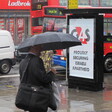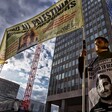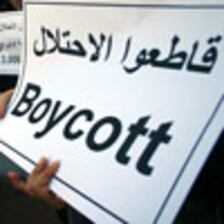The Electronic Intifada 1 June 2012

Simon Natas
Simon Natas is a London-based lawyer specializing in criminal defense law and human rights. Natas is involved with the organization Jews for Justice for Palestinians and has defended a number of Palestine solidarity activists, including four who blockaded the cosmetics retailer Ahava’s London flagship store in Covent Garden on two occasions in 2009. Ahava closed the store last September; this decision followed a long series of protests outside the store, which led its landlord to refuse to renew the lease.
The Electronic Intifada contributor Adri Nieuwhof interviewed Natas about the protesters’ case and the role of G4S Israel, a subsidiary of British-Danish security firm G4S, in Israel’s occupation and repression of Palestinians. Meanwhile, G4S won a massive security contract with the London 2012 Summer Olympics worth £200 million ($312.7 million) (“100,000 eye Olympics security jobs with G4S,” The Independent, 15 May 2012).
Adri Nieuwhof: Can you talk about the case against the activists who blockaded Ahava’s shop in London?
Simon Natas: In 2009, I defended a number of activists who carried out a peaceful blockade of the Ahava shop in Covent Garden. That case was discontinued. There were further blockades in 2010 which resulted in a trial that summer. That trial — again — collapsed and all the defendants were acquitted. Then there were further blockades which resulted in a trial in which there were convictions. Two of those we successfully appealed last month in the High Court. The two remaining convictions were upheld. We are now seeking to appeal in the Supreme Court.
AN: What was your main line of defense in the case against the Ahava protestors?
SN: My clients were charged with an offense known as aggravated trespass. It makes it a criminal offense to trespass on somebody else’s property and in doing so, obstruct lawful activity. So it is part of the prosecution’s case that the activity that you obstruct or intend to obstruct is lawful. You cannot be guilty of the offense if you are obstructing activity that is itself criminal.
Now, the defense that my clients relied on was that the activity they had obstructed was unlawful on a number of different grounds. All arose from the fact that the Ahava products were manufactured in an illegal Israeli settlement in the occupied West Bank called Mitzpe Shalem.
We relied on a number of different allegations of illegality, one of them was the labeling of those products. They were labeled “manufactured by Ahava Dead Sea Laboratories Ltd, Dead Sea, Israel.”
It is quite clear that anybody reading that label would assume that the products were manufactured in Israel, but of course they are not. They are manufactured in the West Bank, which is not recognized by the international community as being part of Israel. Throughout Europe we have laws designed to ensure that consumers are not misled by people who market products.
In the UK, they have been incorporated into our domestic law and are known as the Consumer Protection from Unfair Trading Regulations of 2008. They make it a criminal offense to engage in a misleading omission or misleading action that would cause consumers to buy goods that they might not otherwise buy had they known the true facts or had they not been misled as to the true facts. My clients argued that the labeling of Ahava’s products were clearly misleading, because there are many people out there who would not want to buy products from an illegal Israeli settlement.
There were other allegations of illegality as well. One of the things that my clients argued was that it was potentially illegal to market any product which was the proceeds of a crime in international law. They argued that the establishment of an illegal settlement and a factory on that settlement breached international law and that all the goods that were produced on it were the proceeds of crime. It followed that anyone dealing in those goods was also dealing in the proceeds of crime.
The district judge accepted that my clients had adduced a considerable body of evidence to back up their argument and also that the argument had considerable force, but he did not feel able to rule that Ahava’s trade was unlawful in the context of proceedings in which the company was not itself a party.
AN: G4S is involved in the provision of services to Israeli checkpoints, the police and Israeli prisons. How do you assess G4S’s role in Israel’s violations of international law?
SN: The first thing we need to establish is that we are talking here about G4S Israel, or Hashmira. The shares in this company are held overwhelmingly [91%] by the parent company, which is the British Danish company G4S. But it is G4S Israel operating the contracts in Israel and the occupied territories [the West Bank and Gaza Strip].
The background to this is that in 2002, G4S took over the Israeli security company Hashmira. That company had been engaged in activities in the occupied territories that included providing security services, security guards for settlements in the West Bank and also for businesses and prisons in the West Bank and prisons for Palestinian prisoners in Israel.
Over the years, the parent company G4S has faced considerable criticism from NGOs [nongovernmental organizations], particularly in Denmark, for the activities of its Israeli subsidiary. G4S says it has given up a number of contracts. They say they no longer provide security contracts for settlements themselves. They do still provide services to some businesses and also a police station in the West Bank.
One of the most problematic services they operate is the provision of technical equipment and maintenance for checkpoints. Those include checkpoints in the wall, known by many as the apartheid wall, although the Israeli authorities describe it as the separation barrier.
The wall cuts deep into Palestinian territory, encompassing most of the area of major Israeli settlement activity in the West Bank, and cuts through Palestinian towns such as Qalqiliya. It prevents Palestinians from getting to their land and blocks Palestinian access to East Jerusalem.
The building of this wall was determined by the International Court of Justice in its advisory opinion of 2004 as being illegal, not just because the UN Security Council had said Israel’s occupation of the West Bank was illegal and determined that Israel should leave the occupied Palestinian territory but also because through the construction of this wall Israel was pursuing conduct which they found in breach of Article 49(6) of the Fourth Geneva Convention. This provision makes it a crime for an occupying country to transfer its own population into the territory that it occupies. So the transfer of Israeli civilians into the settlements in the West Bank is a grave breach of the convention.
The court said that the wall had become an integral part of this crime because it was part of a policy of de facto annexation. What they saw was that Israel had created settlements in the West Bank and it had then constructed this wall which was designed ultimately to enable Israel to annex that territory. The court also observed that the wall had a serious impact on Palestinians’ right to access their land, water, education, health care. So it has a significant humanitarian impact as well.
The court talked not only about the wall, but about the wall and its associated regime. It considered that “the construction of the wall and its associated regime create a fait accompli on the ground that could well become permanent in which case and notwithstanding the formal characterization of the wall by Israel it would be tantamount to de facto annexation.”
When one talks about the associated regime of the wall, one certainly talks about the checkpoints, because the wall cannot operate without checkpoints. The checkpoints enable Israeli settlers and indeed Israeli citizens who are not necessarily settlers but may be visiting the settlements, to pass through that wall and access other parts of the West Bank, such as the Jordan Valley, which is subject to a considerable amount of economic exploitation by Israel. Much of the settlement produce which comes out from the [occupied West Bank] comes from the Jordan Valley.
So the checkpoints are necessary in order to allow Israelis access to the West Bank [and] to prevent Palestinians from passing the other way. If you are providing the technical facilities like the scanners and other equipment, and you also have a contract to look after them, to fix them when they go wrong, to ensure that they are working properly, then you are assisting in that process by ensuring that the checkpoints can effectively regulate the movement of people through the wall. That is one area in which G4S Israel may be assisting in something which the International Court of Justice has condemned as a breach of the Geneva conventions.
AN: And how do you assess G4S Israel’s involvement in prisons in Israel?
SN: One of the main areas of criticism from NGOs in Europe and far more significantly, from within Palestine, is the fact that G4S provides electronic security systems to prisons in which Palestinian political prisoners are held. These include both prisons and detention and interrogation centers.
It is well-established that Israel’s detention of Palestinian political prisoners breaches human rights norms routinely. Administrative detention has been much in the news as a result of the recent hunger strike, but it is a very longstanding issue. Criticism of G4S Israel has evolved around its involvement in providing security equipment to those prisons in which Palestinian political prisoners are held. Whether in doing that they are assisting in Israel’s breaches of international law is matter of argument, but it seems to me something that one would not easily be able to exclude.
As a result, it seems to me something G4S should not be doing. Clearly on moral grounds, but it may be legally problematic as well. G4S Israel is participant in the UN Global Compact which has ten principles for businesses. Principle one is that business should support and respect the protection of internationally proclaimed human rights. Principle two is that they must not be complicit in human rights abuses.
Activists and members of NGOs which are concerned about what Western corporations are doing in other parts of the world can look at these legal principles and the norms that they attempt to establish and protect, and then one can look at what these companies are involving themselves in when they provide services to regimes which routinely breach human rights as Israel does in the occupied Palestinian territories.
AN: Do you think companies or its staff can be held accountable for breaches of international law?
SN: Companies themselves cannot be prosecuted in international courts. In domestic jurisdictions there are various crimes that corporations can commit, for example, corporate manslaughter or bribery. Not so for breaches of international law.
It is in theory possible for individuals who are responsible for the behavior of companies to be personally liable. There have been successful prosecutions of directors of companies. There was a well-known case in the Netherlands, the Van Anraat case, in which the director of a company was convicted of selling chemicals to the Saddam Hussein regime, knowing that they would be used to make mustard gas which then be used against civilians. He had no other involvement with the Saddam Hussein regime and no involvement in planning or organizing the attacks. Van Anraat was prosecuted on the basis that he was personally liable for the actions of his company. So it is possible to hold corporate officials responsible for the actions of a company, but every case will turn on its own facts, for example, who was responsible for the decisions and what their state of knowledge was.
AN: Palestine solidarity activists have campaigned to exclude the transportation giant Veolia from bidding for public contracts because of the company’s role in several Israeli projects in the occupied West Bank. They argue that this involvement can be qualified as grave professional misconduct. Do you think the same would apply for G4S?
SN: I think the same arguments made about Veolia can also be made about G4S Israel. I don’t know if the corporate structures of Veolia and G4S are similar, but I think the general point that is made about Veolia is that this is a company which operates in the occupied Palestinian territory through its involvement in building and operating the Jerusalem light railway.
There is a strong argument that the Jerusalem light railway breaches article 49(6) of the Fourth Geneva Convention, a similar criticism to that which can be made about G4S’s involvement in checkpoints for the wall. The Jerusalem light rail connects West Jerusalem with settlements in the [occupied West Bank] and appears designed to achieve the same goal that the International Court of Justice condemned in relation to the building of the wall, i.e. a policy which leads to the de facto annexation of territory in the West Bank and particularly territory around East Jerusalem. So in my opinion the same criticism can be made about G4S’s involvement in the wall. There is a clear analogy there.
Adri Nieuwhof is a consultant and human rights advocate based in Switzerland.





